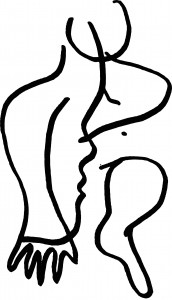“Hillary Clinton ran a child sex ring,” read a headline during the latest presidential race. The headline was absurd, yet my curiosity pushed me to glance over the article. During the two minutes I spent reading sensational falsities about Clinton, I didn’t once consider the negative impacts that such an article could have. Sure, the piece had garnered enough traction to end up on my Facebook feed, but articles detailing Drake’s dating history and listicles proving the presence of UFOs also show up on my feed.
But not all lies are as easily discernable.
Shortly after I engaged with the article about Clinton’s criminal escapades, I started to pay attention to the term “fake news.” Though it’s hard to determine what exactly constitutes fake news, Buzzfeed’s Craig Silverman — one of the leading journalists specializing in fake news — defines it as false stories that are generated by hoax-trafficking sites. The aim for such sites is to gain clicks, and ultimately profit. However, most fake news headlines seem less outlandish than one about Clinton’s alleged sexual exploitation of children, making it difficult for the public to avoid conflating fake news with real news. For example, false headlines range from “Playboy founder Hugh Hefner dead” to a claim that Iraqi forces shot down British planes en route to aid ISIS. Unless you have plenty of free time, sifting through all of the stories in order to determine which ones are credible and which aren’t isn’t feasible.
As fake news permeates through the media ecosystem, questions surrounding its impact arise: What information are audiences consuming? How does this information influence understandings about the workings of the world?
The first question is easier to answer, but only slightly. According to a news analysis led by Silverman, the final three months of the presidential election saw fake news dominate mainstream news outlets. Whereas the best performing election news stories published by sites like the New York Times or the Washington Post enjoyed approximately 7,367,000 likes, shares, and comments on Facebook, false stories about the election generated a whopping 8,711,000 reactions. Although I can’t provide a reason as to why fake news was consumed at higher volumes, it’s clear that false information is unnervingly popular.

Whether or not false information influences public opinion is a question I can only answer speculatively. Citizens trust news media to be informative and accurate. I can’t stress how much power this places in the hands of journalists. Entrusted by the public to relay information about politics, science, arts and culture, celebrity gossip, international news, and more, us journalists get to determine what news deserves public attention. This can in turn shape what issues society cares most about.
Journalists, however, follow ethical codes that fake news distributors do not. During one of my first days at the UBC School of Journalism, my classmates and I were provided with a sheet that outlines our code of ethics from the Society of Professional Journalists. Minimizing the harm that stories can inflict on sources, sharing accurate information, never distorting facts deliberately, and admitting mistakes, among other declarations, make up the main tenets of journalism. In spite of strict adherence to ethical guidelines, maintaining the public’s trust in an era of fake news isn’t easy for journalists. When honest headlines intersect with farces masquerading as news, it comes as no surprise that a disgruntled public loses trust in news media, including reporting from honest, independent journalists.
In addition to misleading the public, fake news provides politicians with a cop-out argument when news coverage is critical of their administrations. Recall the now infamous press conference where President Trump berated CNN’s Jim Acosta for being “fake news.” Trump delegitimized a journalist whose role is to hold the president accountable. The president has since expressed his belief that CNN and the rest of the mainstream media belong to the fake news machine.

The assertion that mainstream media organizations push fake news further blurs the line between credible reporting and the financial opportunism of fake news. When the term fake news becomes a colloquial phrase used to refute any story in ideological opposition to a person’s beliefs, it detracts from the severity of fake news. This further erodes the trust relationship between journalists and the public, and safeguards President Trump from headlines that question his presidency.
Canadians are fortunate because fake news hasn’t pervaded our society to the same extent as it has in the United States. As a result, it’s difficult to isolate false headlines or dictatorial uses of the term “fake news” in a Canadian context. Nonetheless, our news feeds seep with American content. Canadians must be vigilant when consuming news in order to avoid falling victim to the fake news epidemic. Plus, because the provincial election is coming up, it’s imperative that we get in the habit of ensuring the information we rely on is credible so that we can make informed decisions when casting our ballots.
The current media landscape isn’t as grim as I’ve made it out to be, however. Audiences have insurmountable agency to seek out factual information. So to the readers of Discorder, I say this: always be skeptical. When you read a news story, first identify where the article was published. Did a media organization you trust share the article? By turning to local publications like The Tyee or The National Observer, you’re placing your faith in journalists who work tirelessly to ensure their articles are fact-checked, and admit mistakes when their reporting goes awry. You can also verify information by looking for similar news stories published by multiple media organizations — it doesn’t take long to ensure you are consuming trustworthy content.
My final plea is that you don’t lose trust in news media and independent journalists. As discussed earlier, journalists have ethical codes that shape their reporting. When you’re too busy at work to attend a political press conference, or you have a midterm that is preventing you from discovering innovative scientific research, journalists work to fill the void. Legitimate reporters attend press conferences, dig for new information, and fact-check meticulously in order to hold powerful people accountable and make pertinent information readily available. It can be disorientating to wade through the hoax-plagued media landscape, but we’re all capable of immunizing ourselves against false information. So the next time you scroll mindlessly through your feed, toss fake news aside and turn to those organizations that work tirelessly to share factual information.


